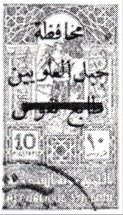Stamp: Harvester (Alaouites 1948)
Harvester (Alaouites 1948)
01 January (Alaouites ) within release Fiscal goes into circulation Stamp Harvester face value 10 Syrian piastre
| Stamp Harvester in catalogues | |
|---|---|
| Colnect codes: | Col: SY-ALA F1948-11 |
Stamp is square format.
Syria fiscal stamp with a three-line "Mohafiza Jebel al-Alawiyin Census Tax" (Government of Jebel Alaouites Census Tax) Arabic overprint in red, with the final line obliterated by a black bar Year of issue is approximate Revenue Reverend cat. no: X131 (Illustration in black and white, to be replaced once a better image is available)Also in the issue Fiscal:
- Stamp - Aleppo Citadel face value 15;
- Stamp - Harvester face value 10;
|
Data entry completed
53%
|
|
|---|---|
| Stamp Harvester in digits | |
| Country: | Alaouites |
| Date: | 1948-01-01 |
| Perforation: | 11 |
| Emission: | Revenue |
| Format: | Stamp |
| Face Value: | 10 Syrian piastre |
Stamp Harvester it reflects the thematic directions:
Agriculture is the cultivation and breeding of animals, plants and fungi for food, fiber, biofuel, medicinal plants and other products used to sustain and enhance human life.[1] Agriculture was the key development in the rise of sedentary human civilization, whereby farming of domesticated species created food surpluses that nurtured the development of civilization. The study of agriculture is known as agricultural science. The history of agriculture dates back thousands of years, and its development has been driven and defined by greatly different climates, cultures, and technologies. Industrial agriculture based on large-scale monoculture farming has become the dominant agricultural methodology.
A census is the procedure of systematically acquiring, recording and calculating population information about the members of a given population. This term is used mostly in connection with national population and housing censuses; other common censuses include censuses of agriculture, traditional culture, business, supplies, and traffic censuses. The United Nations (UN) defines the essential features of population and housing censuses as "individual enumeration, universality within a defined territory, simultaneity and defined periodicity", and recommends that population censuses be taken at least every ten years. UN recommendations also cover census topics to be collected, official definitions, classifications and other useful information to co-ordinate international practices
A people is a plurality of persons considered as a whole, as is the case with an ethnic group or nation. Collectively, for example, the contemporary Frisians and Danes are two related Germanic peoples, while various Middle Eastern ethnic groups are often linguistically categorized as Semitic peoples.
A woman is an adult female human. Before adulthood, a woman is referred to as a girl (a female child or adolescent)




